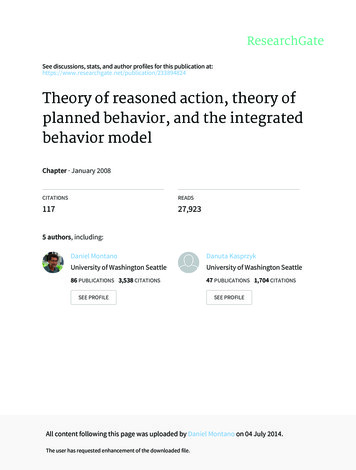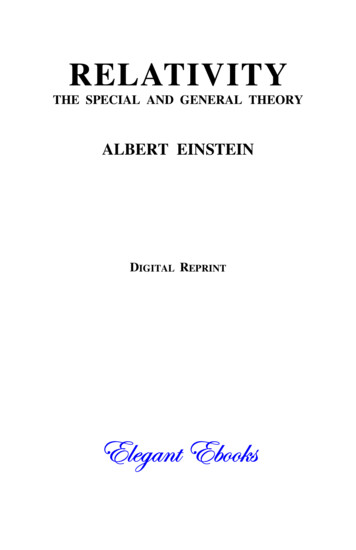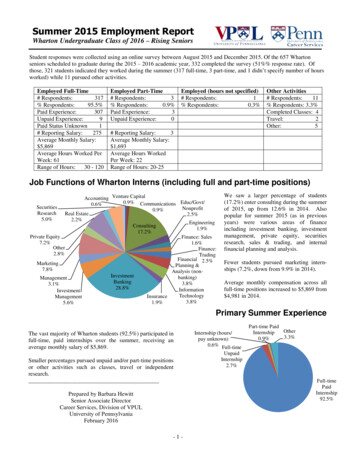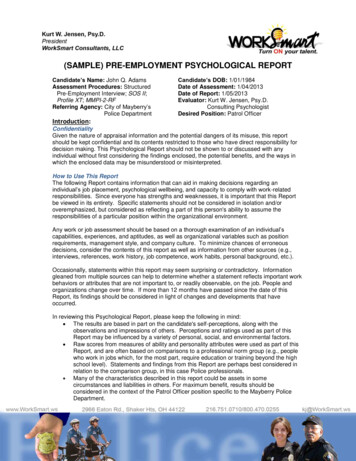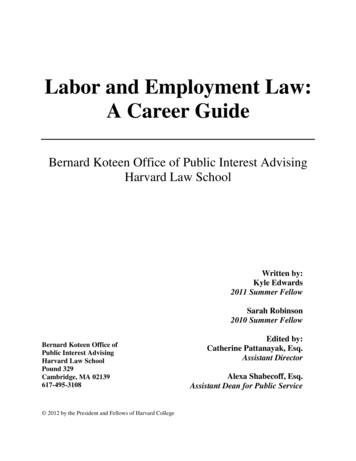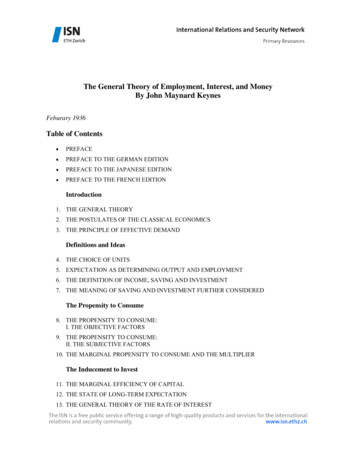
Transcription
The General Theory of Employment, Interest, and MoneyBy John Maynard KeynesFeburary 1936Table of Contents PREFACE PREFACE TO THE GERMAN EDITION PREFACE TO THE JAPANESE EDITION PREFACE TO THE FRENCH EDITIONIntroduction1. THE GENERAL THEORY2. THE POSTULATES OF THE CLASSICAL ECONOMICS3. THE PRINCIPLE OF EFFECTIVE DEMANDDefinitions and Ideas4. THE CHOICE OF UNITS5. EXPECTATION AS DETERMINING OUTPUT AND EMPLOYMENT6. THE DEFINITION OF INCOME, SAVING AND INVESTMENT7. THE MEANING OF SAVING AND INVESTMENT FURTHER CONSIDEREDThe Propensity to Consume8. THE PROPENSITY TO CONSUME:I. THE OBJECTIVE FACTORS9. THE PROPENSITY TO CONSUME:II. THE SUBJECTIVE FACTORS10. THE MARGINAL PROPENSITY TO CONSUME AND THE MULTIPLIERThe Inducement to Invest11. THE MARGINAL EFFICIENCY OF CAPITAL12. THE STATE OF LONG-TERM EXPECTATION13. THE GENERAL THEORY OF THE RATE OF INTEREST
14. THE CLASSICAL THEORY OF THE RATE OF INTERESToAPPENDIX ON THE RATE OF INTEREST IN MARSHALL'S PRINCIPLES OFECONOMICS, RICARDO'S PRINCIPLES OF POLITICAL ECONOMY, ANDELSEWHERE2. THE PSYCHOLOGICAL AND BUSINESS INCENTIVES TO LIQUIDITY3. SUNDRY OBSERVATIONS ON THE NATURE OF CAPITAL4. THE ESSENTIAL PROPERTIES OF INTEREST AND MONEY5. THE GENERAL THEORY OF EMPLOYMENT RE-STATEDMoney-wages and Prices6. CHANGES IN MONEY-WAGESoPROFESSOR PIGOU'S 'THEORY OF UNEMPLOYMENT'7. THE EMPLOYMENT FUNCTION8. THE THEORY OF PRICESShort Notes Suggested by the General Theory9. NOTES ON THE TRADE CYCLE10. NOTES ON MERCANTILISM, THE USURY LAWS, STAMPED MONEY AND THEORIES OFUNDER-CONSUMPTION11. CONCLUDING NOTES ON THE SOCIAL PHILOSOPHY TOWARDS WHICH THE GENERALTHEORY MIGHT LEAD Appendix 1 Appendix 2 Appendix 32
PREFACEThis book is chiefly addressed to my fellow economists. I hope that it will be intelligible to others.But its main purpose is to deal with difficult questions of theory, and only in the second place withthe applications of this theory to practice. For if orthodox economics is at fault, the error is to befound not in the superstructure, which has been erected with great care for logical consistency, butin a lack of clearness and of generality in the pre misses. Thus I cannot achieve my object ofpersuading economists to re-examine critically certain of their basic assumptions except by a highlyabstract argument and also by much controversy. I wish there could have been less of the latter. ButI have thought it important, not only to explain my own point of view, but also to show in whatrespects it departs from the prevailing theory. Those, who are strongly wedded to what I shall call'the classical theory', will fluctuate, I expect, between a belief that I am quite wrong and a belief thatI am saying nothing new. It is for others to determine if either of these or the third alternative isright. My controversial passages are aimed at providing some material for an answer; and I mustask forgiveness If, in the pursuit of sharp distinctions, my controversy is itself too keen. I myselfheld with conviction for many years the theories which I now attack, and I am not, I think, ignorantof their strong points.The matters at issue are of an importance which cannot be exaggerated. But, if my explanations areright, it is my fellow economists, not the general public, whom I must first convince. At this stageof the argument the general public, though welcome at the debate, are only eavesdroppers at anattempt by an economist to bring to an issue the deep divergences of opinion between felloweconomists which have for the time being almost destroyed the practical influence of economictheory, and will, until they are resolved, continue to do so.The relation between this book and my Treatise on Money [JMK vols. v and vi], which I publishedfive years ago, is probably clearer to myself than it will be to others; and what in my own mind is anatural evolution in a line of thought which I have been pursuing for several years, may sometimesstrike the reader as a confusing change of view. This difficulty is not made less by certain changesin terminology which I have felt compelled to make. These changes of language I have pointed outin the course of the following pages; but the general relationship between the two books can beexpressed briefly as follows. When I began to write my Treatise on Money I was still moving alongthe traditional lines of regarding the influence of money as something so to speak separate from thegeneral theory of supply and demand. When I finished it, I had made some progress towardspushing monetary theory back to becoming a theory of output as a whole. But my lack ofemancipation from preconceived ideas showed itself in what now seems to me to be the outstandingfault of the theoretical parts of that work (namely, Books III and IV), that I failed to deal thoroughlywith the effects of changes in the level of output. My so-called 'fundamental equations were aninstantaneous picture taken on the assumption of a given output. They attempted to show how,assuming the given output, forces could develop which involved a profit-disequilibrium, and thusrequired a change in the level of output. But the dynamic development, as distinct from theinstantaneous picture, was left incomplete and extremely confused. This book, on the other hand,has evolved into what is primarily a study of the forces which determine changes in the scale ofoutput and employment as a whole; and, whilst it is found that money enters into the economicscheme in an essential and peculiar manner, technical monetary detail falls into the background. Amonetary economy, we shall find, is essentially one in which changing views about the future arecapable of influencing the quantity of employment and not merely its direction. But our method of3
analysing the economic behaviour of the present under the influence of changing ideas about thefuture is one which depends on the interaction of supply and demand, and is in this way linked upwith our fundamental theory of value. We are thus led to a more general theory, which includes theclassical theory with which we are familiar, as a special case.The writer of a book such as this, treading along unfamiliar paths, is extremely dependent oncriticism and conversation if he is to avoid an undue proportion of mistakes. It is astonishing whatfoolish things one can temporarily believe if one thinks too long alone, particularly in economics(along with the other moral sciences), where it is often impossible to bring one's ideas to aconclusive test either formal or experimental. In this book, even more perhaps than in writing myTreatise on Money, I have depended on the constant advice and constructive criticism of Mr R.F.Kahn. There is a great deal in this book which would not have taken the shape it has except at hissuggestion. I have also had much help from Mrs Joan Robinson, Mr R.G. Hawtrey and Mr R.F.Harrod, who have read the whole of the proof-sheets. The index has been compiled by Mr D. M.Bensusan-Butt of King's College, Cambridge.The composition of this book has been for the author a long struggle of escape, and so must thereading of it be for most readers if the author's assault upon them is to be successful,—a struggle ofescape from habitual modes of thought and expression. The ideas which are here expressed solaboriously are extremely simple and should be obvious. The difficulty lies, not in the new ideas,but in escaping from the old ones, which ramify, for those brought up as most of us have been, intoevery corner of our minds.J. M. KEYNES13 December 19354
PREFACE TO THE GERMAN EDITIONAlfred Marshall, on whose Principles of Economics all contemporary English economists have beenbrought up, was at particular pains to emphasise the continuity of his thought with Ricardo's. Hiswork largely consisted in grafting the marginal principle and the principle of substitution on to theRicardian tradition; and his theory of output and consumption as a whole, as distinct from his theoryof the production and distribution of a given output, was never separately expounded. Whether hehimself felt the need of such a theory, I am not sure. But his immediate successors and followershave certainly dispensed with it and have not, apparently, felt the lack of it. It was in thisatmosphere that I was brought up. I taught these doctrines myself and it is only within the lastdecade that I have been conscious of their insufficiency. In my own thought and development,therefore, this book represents a reaction, a transition away from the English classical (or orthodox)tradition. My emphasis upon this in the following pages and upon the points of my divergence fromreceived doctrine has been regarded in some quarters in England as unduly controversial. But howcan one brought up a Catholic in English economics, indeed a priest of that faith, avoid somecontroversial emphasis, when he first becomes a Protestant?But I fancy that all this may impress German readers somewhat differently. The orthodox tradition,which ruled in nineteenth century England, never took so firm a hold of German thought. Therehave always existed important schools of economists in Germany who have strongly disputed theadequacy of the classical theory for the analysis of contemporary events. The Manchester Schooland Marxism both derive ultimately from Ricardo,—a conclusion which is only superficiallysurprising. But in Germany there has always existed a large section of opinion which has adheredneither to the one nor to the other.It can scarcely be claimed, however, that this school of thought has erected a rival theoreticalconstruction; or has even attempted to do so. It has been sceptical, realistic, content with historicaland empirical methods and results, which discard formal analysis. The most important unorthodoxdiscussion on theoretical lines was that of Wicksell. His books were available in German (as theywere not, until lately, in English); indeed one of the most important of them was written in German.But his followers were chiefly Swedes and Austrians, the latter of.whom combined his ideas withspecifically Austrian theory so as to bring them in effect, back again towards the classical tradition.Thus Germany, quite contrary to her habit in most of the sciences, has been content for a wholecentury to do without any formal theory of economics which was predominant and generallyaccepted.Perhaps, therefore, I may expect less resistance from German, than from English, readers in offeringa theory of employment and output as a whole, which departs in important respects from theorthodox tradition. But can I hope to overcome Germany's economic agnosticism? Can I persuadeGerman economists that methods of formal analysis have something important to contribute to theinterpretation of contemporary events and to the moulding of contemporary policy? After all, it isGerman to like a theory. How hungry and thirsty German economists must feel after having livedall these years without one! Certainly, it is worth while for me to make the attempt. And if I cancontribute some stray morsels towards the preparation by German economists of a full repast oftheory designed to meet specifically German conditions, I shall be content. For I confess that muchof the following book is illustrated and expounded mainly with reference to the conditions existingin the Anglo-Saxon countries.5
Nevertheless the theory of output as a whole, which is what the following book purports to provide,is much more easily adapted to the conditions of a totalitarian state, than is the theory of theproduction and distribution of a given output produced under conditions of free competition and alarge measure of laissez-faire. The theory of the psychologi-cal laws relating consumption andsaving, the influence of loan expenditure on prices and real wages, the part played by the rate ofinterest—these remain as necessary ingredients in our scheme of thought.I take this opportunity to acknowledge my indebtedness to the excellent work of my translator HerrWaeger (I hope his vocabulary at the end of this volume may prove useful beyond its immediatepurpose) and to my publishers, Messrs Duncker and Humblot, whose enterprise, from the days nowsixteen years ago when they published my Economic Consequences of the Peace, has enabled me tomaintain contact with German readers.J. M. KEYNES7 September 19366
PREFACE TO THE JAPANESE EDITIONAlfred Marshall, on whose Principles of Economics all contemporary English economists have beenbrought up, was at particular pains to emphasise the continuity of his thought with Ricardo's. Hiswork largely consisted in grafting the marginal principle and the principle of substitution on to theRicardian tradition; and his theory of output and consumption as a whole, as distinct from his theoryof the production and distribution of a given output, was never separately expounded. Whether hehimself felt the need of such a theory, I am not sure. But his immediate successors and followershave certainly dispensed with it and have not, apparently, felt the lack of it. It was in thisatmosphere that I was brought up. I taught these doctrines myself and it is only within the lastdecade that I have been conscious of their insufficiency. In my own thought and development,therefore, this book represents a reaction, a transition away from the English classical (or orthodox)tradition. My emphasis upon this in the following pages and upon the points of my divergence fromreceived doctrine has been regarded in some quarters in England as unduly controversial. But howcan one brought up in English economic orthodoxy, indeed a priest of that faith at one time, avoidsome controversial emphasis, when he first becomes a Protestant?Perhaps Japanese readers, however, will neither require nor resist my assaults against the Englishtradition. We are well aware of the large scale on which English economic writings are read inJapan, but we are not so well informed as to how Japanese opinions regard them. The r
money-wages and prices 6. changes in money-wages o professor pigou's 'theory of unemployment' 7. the employment function 8. the theory of prices short notes suggested by the general theory 9. notes on the trade cycle 10. notes on mercantilism, the usury laws, stamped money and theories of under-consumption 11. concluding notes on the social .



